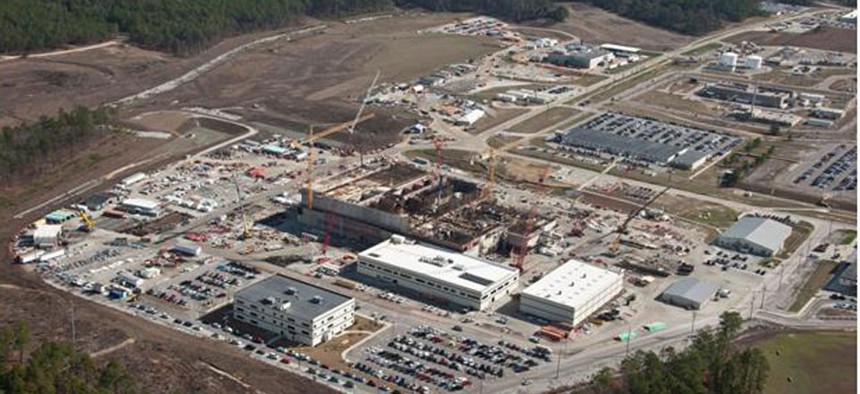Obama Budget Plan Puts Controversial Plutonium-Conversion Facility on Hold

The MOX site in 2012 was under heavy construction. Energy Department
South Carolina site deemed too expensive for 2015.
The Obama administration is placing controversial plans to complete construction on a South Carolina facility that would convert nuclear weapon-usable plutonium into reactor fuel on hold as part of the fiscal 2015 budget plan it rolled out on Tuesday.
The facility, which is partially built, would convert plutonium into mixed-oxide fuel.
"A review of this approach has determined that the MOX fuel approach is significantly more expensive than planned and it is not viable within the FY 2015 funding levels," said a summary of the Energy Department budget proposal, released by the White House.
"The Department of Energy is developing alternative approaches to plutonium disposition and will engage with stakeholder to determine a viable alternative," the statement continued. "As a result, the MOX project will be placed in cold standby while an alternative approach is determined."
The announcement comes on the heels of a Nuclear Regulatory Commission licensing board decision to uphold security plans for the controversial facility. It also follows new reports last month on the project's escalating costs.
Watchdog groups are already praising the announcement.
"Converting this plutonium to a form that would be harder to steal or reuse in nuclear weapons is an essential long-term goal," Edwin Lyman, a senior scientist with the Union of Concerned Scientists' global security program, said in a Tuesday statement. "But the MOX strategy would have greatly increased near-term risks by making it easier for terrorists to steal plutonium during processing transport or storage at reactors."
Activists have argued that solidifying the plutonium in a glass-like form could be cheaper and less vulnerable to theft.
The plutonium disposition effort is part of the National Nuclear Security Administration's broader nonproliferation program. In total, the administration is proposing that the semiautonomous Energy Department agency spend $1.6 billion on nonproliferation efforts in fiscal 2015. This would be a 20 percent drop from the $1.9 billon Congress approved for fiscal 2014, which in turn was a $289 million cut from fiscal 2013 levels.
Within the nonproliferation budget, the Obama administration is proposing a 24 percent cut to the Global Threat Reduction Initiative, which aims to secure vulnerable nuclear materials around the world.
"The reduction in FY 2015 funding reflects the expected completion of a major milestone in early FY 2015 of the development of a new domestic, non-[highly enriched uranium]-based supply of the critical medical isotope molybdenum-99 … which is being executed under multiyear contracts funded in previous fiscal years," according to a summary.
The administration is also proposing a 24 percent cut to its International Material Protection and Cooperation program, which works to secure and eliminate vulnerable nuclear weapons and materials. It attributes this in part to the expiration of the longstanding Cooperative Threat Reduction umbrella agreement with Russia last year.
At the same time, it is recommending $8.3 billion for the agency's nuclear weapons programs, which is $533 million -- or 6.9 percent -- more than Congress approved for fiscal 2014. Among the items contributing to the increase is a requested boost to funds for the controversial refurbishment of the B-61 gravity bomb, according to the summary.
The news about the MOX program comes as the Nuclear Regulatory Commission licensing board has rejected activists' claims that plans for the facility do not include adequate security measures.
Shaw AREVA MOX Services -- the federal contractor that is building the facility in question -- praised the NRC panel's ruling. Watchdog groups, meanwhile, are critical of the decision, arguing it could set a bad precedent regarding how sensitive nuclear materials are handled generally.
The timing makes the debate yet more politically relevant, coming less than a month before an international Nuclear Security Summit takes place in the Netherlands.
The groups -- including the Union of Concerned Scientists, Nuclear Watch South and the Blue Ridge Environmental Defense League -- argued in their unsuccessful legal challenge that the contractor's plan relied too much on computers -- and not enough on humans -- to verify that the weapons-grade plutonium was accounted for and secure. They claimed the approach could make the facility vulnerable to theft and cyber-attack.
The NRC Atomic Safety and Licensing Board ruled last week that the contractor's plan was in compliance with the commission's regulations, however. The commission has yet to release the ruling, as its Office of Nuclear Security and Incident Response is reviewing the document to determine whether any "security--related information … must be withheld," according to a Feb. 27 announcement.
Shaw AREVA MOX Services voiced its support for the ruling in a March 3 statement.
"We are very pleased with the licensing board's decision, which upholds the conclusion that the MOX facility meets the NRC's regulations for nuclear material control and accounting," said Kelly Trice, the company's president. "Safety and security are top priorities in the design, construction and operation of the MOX facility."
The company noted that NRC technical staff had concluded previously that its plan would not pose an undue risk to worker safety and health in a 2010 report. The five-member, presidentially-appointed commission itself has yet to make a final decision on licensing the MOX facility.
Lyman, the UCS senior scientist, said he remained convinced that the company's plan "is deeply deficient and [that the firm] is simply incapable of security and accounting for this incredibly dangerous material.
"The initial decision to grant this facility an operating license, allowing it to take possession of at least 34 tons of U.S. surplus plutonium, is reckless and will increase the risk that terrorists will be able to acquire enough plutonium to build a nuclear bomb without detection," Lyman said in a Feb. 27 statement.
Lyman told Global Security Newswire this week that he feared the licensing board's decision sets a bad precedent heading into the upcoming Nuclear Security Summit.
"I fear this will send the wrong signal to other countries that operate or plan to build bulk handling facilities for special nuclear material, like France, Japan, the U.K., India, China, and most notably, Russia -- which is supposed to be developing a plutonium disposition program in parallel," he said.
Lyman was referring to the agreement between the United States and Russia to dispose of surplus weapons grade material from the Cold War. The United States opted to uphold its end of the bargain by building the MOX facility, but the Obama administration may now be considering other options, due to the Energy Department program's rising costs.
Among the aspects of the MOX the security plan that worry Lyman are "claims that computer programs used to track the plant's inventory for ordinary business purposes can do double-duty to accurately account for plutonium items for national security purposes, eliminating the need for people to physically access and inspect the item," Lyman said in Feb. 28 statement released by Nuclear Watch South.
"Given the vulnerability of computer systems to manipulation by adversaries, this data can be corrupted," Lyman said. "There is no substitute for direct physical checks."
Shaw AREVA disputed Lyman's claims in a legal brief last year. While activists "frequently refer to the [computer] systems as 'substitute[s]' or a second best choice for what they refer to as 'physical retrieval and inspection,'" they "have not articulated precisely what they mean by 'physical retrieval and inspection'" during closed-door hearings, the May 3, 2013, brief said.
The activists' "suggestion that [the company's] proposed approach is second best is plainly incorrect, given the extensive testimony on the automation, reliability and reduction of opportunities for human effort provided by" the system, the company said.






